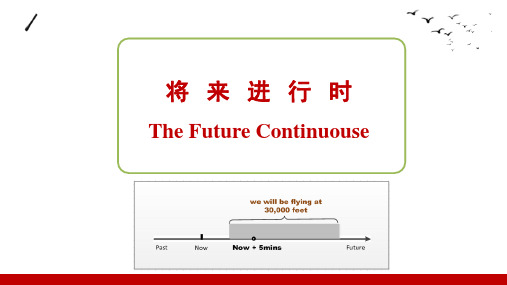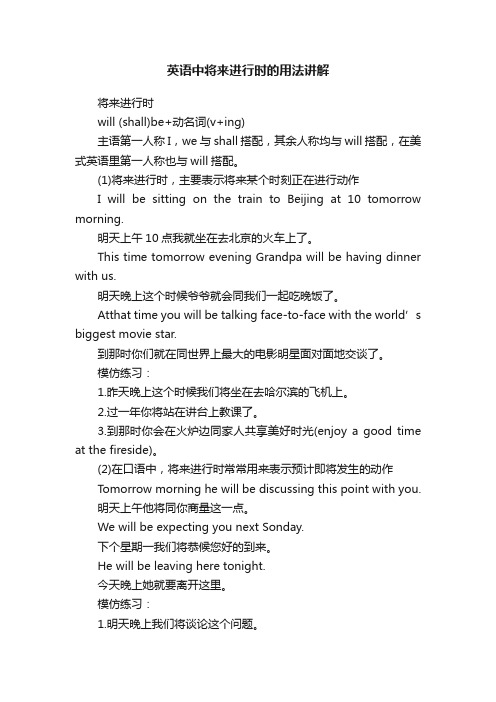将来进行时
将来进行时的用法和表示方式

将来进行时的用法和表示方式将来进行时是英语中表示将来某个时间点或某个时间段内正在进行的动作或状态的时态。
它用于强调将来的持续性动作或状态。
一、结构将来进行时的结构为:will be + 动词-ing。
其中,will be 是将来时的助动词,be 是进行时的助动词形式,动词-ing 是动词的现在分词形式。
例如:1. I will be working at the office tomorrow.(明天我将在办公室工作。
)2. She will be studying in the library this evening.(今晚她将在图书馆学习。
)二、用法和表示方式1. 表示将来某个时间点的持续动作将来进行时可以用来描述将来某个时间点开始,一直持续进行的动作。
例如:- I will be watching a movie at 8 p.m. tonight.(今晚8点我将在看电影。
)- They will be having a meeting at 10 a.m. tomorrow.(明天上午10点他们将在开会。
)2. 表示将来某段时间内的持续状态将来进行时还可以用于描述将来某段时间内一直持续的状态。
例如:- She will be living abroad for a year.(她将在国外住一年。
)- We will be staying at the beach for the weekend.(我们将在海滩度过周末。
)3. 表示计划或安排将来进行时还可以用于表示已经计划或安排好的将来某个时间点或时间段内的动作或状态。
例如:- They will be visiting us next month.(他们下个月将来看我们。
)- I will be working on a new project next week.(下周我将在做一个新项目。
)4. 表示猜测或推测将来进行时还可以用于表示根据现有证据猜测或推测的将来动作或状态。
(完整版)将来进行时的结构

(完整版)将来进行时的结构(完整版)将来进行时的结构将来进行时是英语中表示将来某一时刻会进行的动作的时态。
它的结构是由“will be + 现在分词”组成。
一、使用情景将来进行时常用于以下情况:1. 表示将来的计划或安排,如:- Tomorrow afternoon, I will be attending a meeting.明天下午,我将参加一个会议。
- Next week, she will be traveling to Europe.下周,她将去欧洲旅行。
2. 表示将来某一特定时间正在进行的动作,如:- By this time tomorrow, I will be working on my presentation.明天这个时候,我将正在做我的演讲稿。
- At 8 PM tonight, they will be having dinner with their friends.今晚8点,他们将正在和朋友一起吃晚饭。
3. 表示预测的将来状态,如:- In a few years, renewable energy will be replacing fossil fuels.几年后,可再生能源将取代化石燃料。
- By 2030, most cars will be running on electricity.到2030年,大部分汽车将使用电力。
二、注意事项1. 使用将来进行时时需注意动词的变化,即将动词的基本形式加上-ing。
但也有一些特殊情况,如动词以“e”结尾,则需将“e”改为“ing”,或者以辅音字母+y结尾,将“y”改为“i”,再加上“ing”等。
2. 将来进行时通常与将来时态连用,即使用“will”作为助动词。
3. 在肯定句中,将来进行时结构为“主语 + will be + 现在分词”。
否定句和疑问句的构成如下:- 否定句:主语 + will not be + 现在分词- 疑问句:Will + 主语 + be + 现在分词?三、例句1. This time next week, I will be enjoying my vacation on the beach.到下周的这个时候,我将正享受在海滩度假。
将来进行时

将来进行时示将来正在进行
的事件。 如:I will be swimming at 5:00 p.m. tomorrow. 明天下午5点我将正在游泳。
将来进行时的结构
主语+will be+v.ing+时间状语 如:He will be going to Zhong Shan park at 8:00 a.m. this weekend. 这个周末他将去中山公园。
She will be getting ready for the party tomorrow. 明天她将为聚会做 准备。
现在进行时变将来进行时
例:He is working in the garden. 他正在花园干活。 变成:He will be working in the garden tomorrow. 明天他将在花园工作。
She is getting ready for the party. 她正在为聚会做 准备。
将来进行时的结构
肯定句:主语+will be+v.ing+时间状 语 He will be going to Zhong Shan park at 8:00 a.m.this weekend. 否定句: 主语+will be + not+v.ing+时间状语 一般疑问句: Will+主语+be +v.ing + 时间状语
英语语法-将来进行时

The Future Continuouse
1 将来进行时的定义
1.将来进行时表示将来某一时刻或某一段时间内可能正在 进行或发生的动作。
通常句子一定会有一个“表示将来某个时间点”的状语。 如: She will be doing her homework at 8 p.m. tonight.
2. I hope scientists _w__il_l_f_in_d_ (find) a cure for cancer.
3. A Chinese astronaut _w__il_l_r_e_a_c_h(reach)
Mars by 2050.
注意: 用于将来进行时的谓语动词必须是可延 续性动词, 短暂性动词则不可, 如上面5, 6题。
2 将来进行时的结构
主语 + shall/will+be +v.-ing + 其它
肯Байду номын сангаас 形式
will + be doing
否定 形式
will + not + be doing
问句 形式
will+主+ be doing?
He will be sleeping at this time tomorrow night.
He will be playing tennis at this moment tomorrow .
1 将来进行时的定义
2.将来进行时表示已经决定或安排好的要发生的动作或事 情;表示按预测将会发生的事情。
如: She will be coming soon. I'll be meeting him sometime in the future.
将来进行时态

将来进行时1) 概念:表示将来某时进行的状态或动作,或按预测将来会发生的事情。
She'll be coming soon.I'll be meeting him sometime in the future.注意:将来进行时不用于表示"意志",不能说I'll be having a talk with her.2)常用的时间状语Soon, tomorrow, this evening,on Sunday, by this time,tomorrow, in two days, tomorrow eveningBy this time tomorrow, I'll be lying on the beach.1. 概念:将来进行时主要表示将来某一时间正在进行的动作,或表示要在将来某一时间开始,并继续下去的动作。
常用来表示礼貌的询问、请求等。
如:This time next day they will be sitting in the cinema.下一天的这个时间,他们正坐在电影院。
What will you be doing at six tomorrow evening?明天晚上六点你将在干什么?He won’t be coming to the party.他将不去参加聚会了。
I’ll be meeting him tomorrow/next year/some time.我明天/下一年/某个时间将去见他。
2)常用的时间状语Soon, tomorrow, this evening,on Sunday, by this time,tomorrow, in two days, tomorrow eveningBy this time tomorrow, I'll be lying on the beach.明天的这个时间,我将在海滩上。
将来进行时

将来进行时定义将来进行时主要表示将来某一时间正在进行的动作,或表示要在将来某一时间开始,并继续下去的动作。
构成主语+ will + be + V-ing用法 1.表示将来某一时间正在进行的动作,一般带状语。
2.表示现在正在进行的动作,但这个动作会延续到将来。
3.表示预定的将来动作或对将来的预测。
4.表示委婉的请求5.表示原因、结果6.表示对将来的打算标志词Soon, tomorrow, this evening,on Sunday, by this time,tomorrow, intwo days, tomorrow evening将来进行时和一般将来时的区别:两者都表示将来的行为,但在用法上有所区别:(1) 将来进行时表示将来某一时刻或某一段时间里正在进行的动作;而一般将来时表示将来某时将要发生的动作。
(2) 将来进行时常用来表示说话人设想已经安排好的事;而一般将来时表示临时决定。
(3) 将来进行时不表示个人意愿。
(4) 将来进行时比一般将来时在语气上要委婉客气。
注:英语中有四类动词一般不用进行时1)表心理状态、情感的动词,如love ,hate ,like ,care ,respect ,please ,prefer ,know 等,若用进行时则词意改变。
2)表存在、状态的动词,如appear ,exist ,lie ,remain ,stand ,seem等3)表感觉、感官的动词,如see ,hear ,feel ,smell ,sound ,taste等.4)表一时性的动词,如accept ,allow ,admit ,decide ,end ,refuse ,permit ,promise等。
英语中将来进行时的用法讲解

英语中将来进行时的用法讲解将来进行时will (shall)be+动名词(v+ing)主语第一人称I,we与shall搭配,其余人称均与will搭配,在美式英语里第一人称也与will搭配。
(1)将来进行时,主要表示将来某个时刻正在进行动作I will be sitting on the train to Beijing at 10 tomorrow morning.明天上午10点我就坐在去北京的火车上了。
This time tomorrow evening Grandpa will be having dinner with us.明天晚上这个时候爷爷就会同我们一起吃晚饭了。
Atthat time you will be talking face-to-face with the world’s biggest movie star.到那时你们就在同世界上最大的电影明星面对面地交谈了。
模仿练习:1.昨天晚上这个时候我们将坐在去哈尔滨的飞机上。
2.过一年你将站在讲台上教课了。
3.到那时你会在火炉边同家人共享美好时光(enjoy a good time at the fireside)。
(2)在口语中,将来进行时常常用来表示预计即将发生的动作Tomorrow morning he will be discussing this point with you.明天上午他将同你商量这一点。
We will be expecting you next Sonday.下个星期一我们将恭候您好的到来。
He will be leaving here tonight.今天晚上她就要离开这里。
模仿练习:1.明天晚上我们将谈论这个问题。
2.记住,我会在机场等你的。
3.后天上午珍妮就要离开深圳了。
比较:将来进行时常可与将来一般时交换,不过将来进行时较生动、委婉一些。
例如:I will be waiting for you at the airport.我会在机场(专心、急切地)等着你。
将来进行时

将来进行时1.将来进行时的构成将来进行时由shall be/will be +现在分词构成.第一人称用shall/will be, 其余人称用will be 2.将来进行时的肯定,否定,一般疑问式及回答.以行为动词work为例肯定式:I (we) shall/will be working, She (he, you, we, they) will be working否定式I (we) shan’t/won’t be working He (She, You, we, they) won’t be working疑问式及回答Shall I be working? Will she be working?Yes, we shall Yes, you will No, you won’t. No, we shan’t3.将来进行时的用法1). 表示在将来某一时刻或某一段时间正在进行的动作,常常带有时间状语短语或时间状语从句.When you get to the station at nine tomorrow, your uncle will be waiting for you there.I’ll be busy this evening. I will be writing an article.2). 表示按计划将来要发生的动作I hope you will be coming on time.They will be having their holiday in June.4.一般将来时与将来进行时的区别1). 一般将来时表示将来发生的动作或情况,将来进行时则强调这种动作的持续性.I hope it won’t rain tomorrow. 我希望明天不下雨. (只表示将来的情况)It’s raining again. I hope it won’t still be raining tomorrow. 又下雨了.我希望明天不再下雨. (强调情况的持续性)2)一般将来时常带有意愿,意图等情态意义; 将来进行时只是单纯陈述即将发生的动作,不带情态意义. 用于问句中语气比较委婉.China will play an important role in the WTO. (意愿)My uncle will be driving to Nanjing tomorrow. (陈述事实)Will you go to see Li Yan soon? (意愿)Will you be leaving for Shanghai soon? (语气委婉)。
- 1、下载文档前请自行甄别文档内容的完整性,平台不提供额外的编辑、内容补充、找答案等附加服务。
- 2、"仅部分预览"的文档,不可在线预览部分如存在完整性等问题,可反馈申请退款(可完整预览的文档不适用该条件!)。
- 3、如文档侵犯您的权益,请联系客服反馈,我们会尽快为您处理(人工客服工作时间:9:00-18:30)。
将来进行时要点1:表示将来某一时刻正在进行的动作或某一时段内持续的动作例题:Daniel’s family ____their holiday in Huangshan this time next week. (2009 安徽)A.are enjoyingB. are to enjoyC. will enjoyD. will be enjoying正确表示将来某一时刻度假这个动作正在进行一般将来时表示将来某个时间将要发生的动作。
将来进行时出来表示将来某一时刻某一动作正在进行外,还表示将来某一时段内持续的动作例如,From tomorrow to next Friday, we will be traveling along the Three Gorges要点2:表示现在正在进行的动作,但,这个动作将会持续到将来例题:paul is still in the lab. I think that he ____ the experiment until tomorrow morning.A.will be doing正确B. is doingC. will be doneD. does根据题干意思,保罗仍在实验室。
我认为他将一直做到明天早上,做实验这个动作现在正在进行,而且将会延续到明天早上,用将来进行时例如,I wonder if the wind will still be blowing until tomorrow morning.要点3:表示将来自然而然会发生的事,而非认为安排例题:The weather report says that it ____ when we arrive in Wuxi City tomorrow afternoon. A.is snowing B. snows C. will be snowing正确 D. has been snowing根据天气预报说,可知明天下午我们到达无锡市时,天将正下着雪是自然而然发生的事,用将来进行时例如,The train will be arriving at two o’clock.要点4:表示有礼貌地询问对方或别人计划要做的事例题:-- ____you _____ basketball this weekend? If you will, could I join you?-Yes. Welcome to join us!A.Do; playB.Have; playedC.Are; playingD.Will; be playing正确根据语境可以判断第一个人想加入别人的团队打篮球,为了使预期委婉,有礼貌,使用将来进行时。
将来进行时可以表示委婉或有礼貌的询问、请求等语气例如,Will you be coming to my birthday party this evening?过去将来时要点1:表示在过去某个时间看来,将要发生的动作例题:We were all surprised when he made it clear that he _____ office soon.A.leavesB. would leave正确C. leftD. had left根据时间状语soon和主句时态可以判断选择B,用过去将来时would+动词原形,表示leave 这个动作在过去某个时间看来将要发生。
例如,He said that he would wait for us at the bus stop此外,would+ 动词原形还可以表示过去的某种习惯性行为。
例如,Whenever I got in trouble, he would come to help me.要点2:过去将来时的其他形式例题:-----Bob, you didn’t go to the party last night?----- I ____, but I suddenly remembered I had to do my homework first.A.had toB. didn’tC. was going toD. wouldn’t根据语境,可以看出Bob本来打算要去参加做完的聚会的,所以用was going to do sth. 表示过去打算要做某事。
was/were going to do sth. 表示准备、计划做某事,或将要发生某事。
又如There was going to be a storm.能够表示过去将来时含义的形式还有:1)was/ were about to do sth. 表示正要,即将做某事。
如: She was about to leave when her friend came.她的朋友来时,她正要离开。
2)go, come, leave, take off, arrive, start等少数动词(词组)用于过去进行时,表示过去将要发生的事情如: They said they were leaving for America soon.他们说他们不久就要动身去美国3)was /were to do sth. 表示计划、安排要做的事情如: He was to meet her at 11 at the school gate. 他和她11点将在校门口见面。
Grammar in Text阅读下面短文,用所给动词或词组的适当形式填空A small town near a beach in ItalyThis is a personal question because my wife and I 1. (look for) a small town in Italy not too far from the beach. We 2. (be) there in August, so we’re looing for a place that 3. (draw) too many tourists --- we’re not crazy about crowds. The town doesn’t have to be on the beach, but a short train ride away would be nice.We spent a month in Rome. We love Rome but in the summer I 4. (guess) it’ll be crazily crowded. We 5. (spend) a month in Assisi which my wife loved. She said she 6. (go ) back. I’d prefer some place peaceful and some place where it’d be easier to meet Italians.An Italian language course 7. (be) a bonus(意外的好处). Idon’t think I 8. (rent) a car, so a train station is probably necessary.Is there anyone who has any ideas for me?语法专练I.用所给动词的适当形式填空1.---- I hear that you and your family are going on a holiday.---- Yes. At this time next weekend we ____ (visit) Zhouzhuang in Suzhou.2.In a room next to our office, where an important meeting _____ (hold), the secretary wasbusily preparing for it.3.---Can we pay a visti to you at 9 o’clock tomorrow morning?---I’m sorry. I ____ (give) a lecture at that time.4.---What did your brother say in his letter?---He told me that he ____ (travel) around the next week.5.What do you think the childre _____ (do) when we get home?6.When I went into the office, the secretary ____(put) away the documents and ____ (leave).II.单项选择1.I’m afraid Iwon’t be free. I _____ a friend off at 3 o’clock this afternoon at the airport.A.See b. am seeing C. will see D. will be seeing2.Mrs Smith _____ to work when the telephone rangA.Is goingB. will goC. was about to goD. is to go3.The bus _____ at present speed until it reaches Kunshan City at about 5 o’clock this afternon.A.WentB. is goingC. goesD. will be going4.I hoped that Kerry _____ to my party on time the next Saturday.A.Was comingB. is comingC. willD. to come5.He Liang was so kind that he _____ anyone when he saw they needed help.A.HelpsB. would helpC. helpedD. will help6.---Zhang Lin left for Nanjing this morning.---Oh, we though he _____ until the next month.A.Won’t be goingB. isn’t goingC. wasn’t goingD. hadn’t been going7.If you plant watermelon seeds in the spring, you _____ fresh watermelon in the fall.(2010浙江)A.EatB. would eatC. have eatenD. will be eating1.Will be visiting2. Will be3. Doesn’t draw4. Was going to travel5. Will be doing6.Had put; was leaving2.DCDAB CD3.Are looing for will be doesn’t draw Guess 5. Spent 6. Would go 7. Willbe 8. Will be renting。
